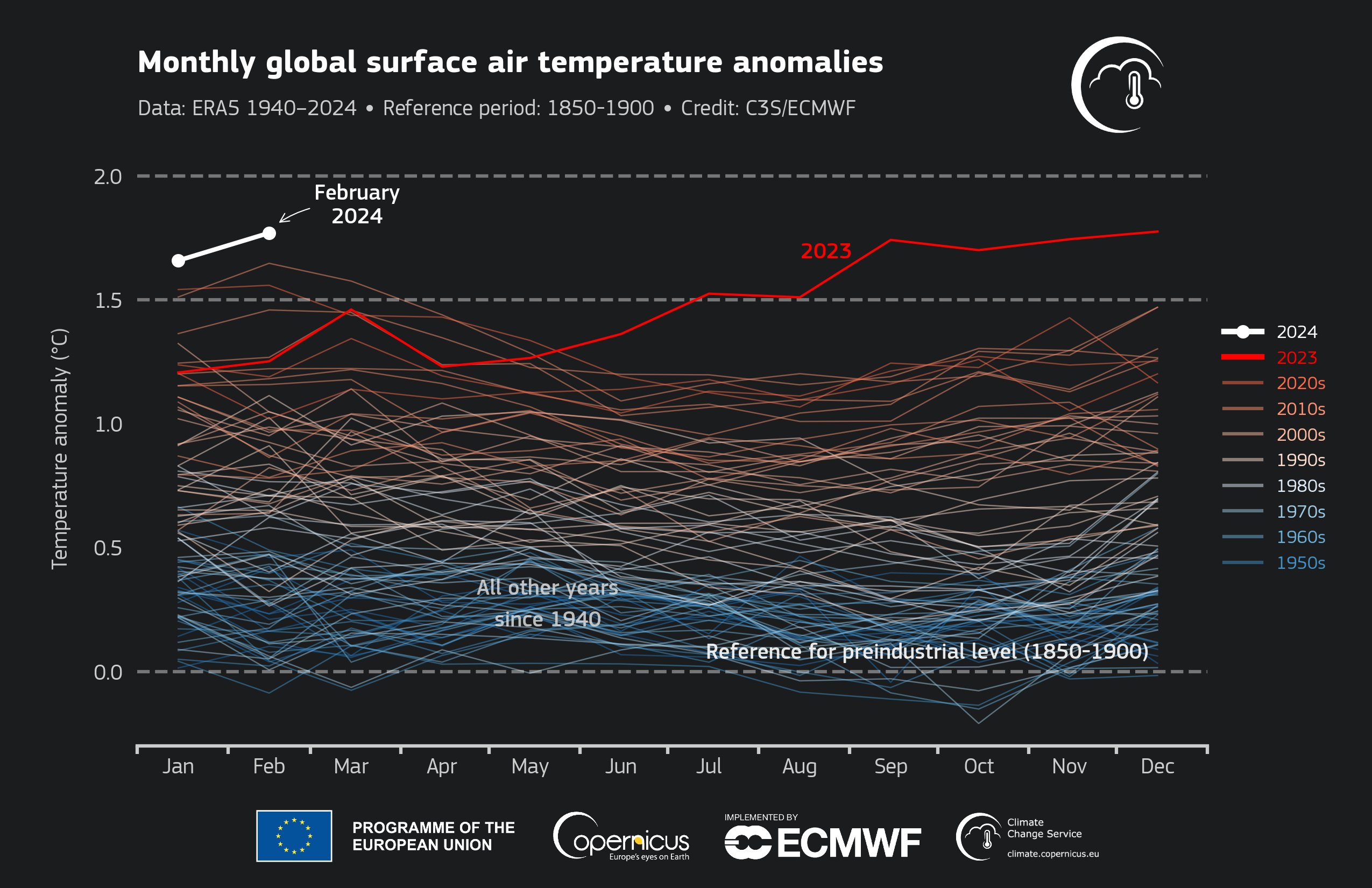Pictured is a graph of historical global sea-surface temperatures across the year from 1982-2024. Yesterday was about 0.3°C warmer than last year. Well, maybe it will go back down since this is an El Niño year? :>
Average global surface air temperature in February 2024 was 1.77°C warmer than the average February from 1850-1900. So maybe we can retire those 1.5°C warming goals now?

However, the IPCC reports that global temperatures have only risen by 1.1°C. This is because they use decade-long averages. Indeed, it is completely possible that 2025 will be cooler than 2024, but crop failures don’t care much for averages.  And if global warming has accelerated, the IPCC’s method will be a decade late to realizing it. Not that they can actually do anything about it…
And if global warming has accelerated, the IPCC’s method will be a decade late to realizing it. Not that they can actually do anything about it…
I’m sure there won’t be any major consequences to saturating the heat sinking capacity of all of the oceans. Also 2040’s here and it called 2030 a nerd, beat it up, and stole its lunch money.
bruh we’re going to figure out how to kind of communicate with cetaceans this decade only for them to go extinct due to food web collapse

“Hey guys. So, first thing, we’re really excited to finally break the interspecies communication barrier! Truly a watershed moment for both our kinds. Second thing: and this is really awkward, but we did kind of a major oopsie. Really sorry about that.”
First message from us to another species will be explaining the concept of death so that we can subsequently apologize for killing them.
In Disco Elysium, the cryptozoologist talks about an intelligent species of sonic waves of some kind, found to be communicating with distinct regional languages.
The scientists trying to communicate with the sound waves accidentally release a sonic wave that causes them all to pop, and their popping makes the same sound, which spreads until there isn’t a sign of any of them left on the planet.
I think about that one story of hers a lot.
It’s cool how the narrative on the right about climate change has changed from it being a
CHINESEtoJEWISHhoax or something to make Donald Trump look bad to now they accept the planet is warming so we need to nuke China to fix it.they accept the planet is warming so we need to nuke China to fix it.
No…

Nuking the Chinese to own the Northern hemisphere

The 5 Tg case scenario is from ref. 16 for an India–Pakistan war taking place in 2008; the 16–47 Tg cases are from ref. 18 for an India–Pakistan war taking place in 2025; and the 150 Tg case is from ref. 51, which assumes attacks on France, Germany, Japan, United Kingdom, United States, Russia and China.
BOE summer '24 looking more and more plausible
BOE?
Blue ocean event, no sea ice. Shit starts to get pretty crazy after that.
Blue Ocean Event - all the summer sea ice disappears
I have a decade-old bet on 2025.
Nothing will fundamentally change, Jack

This is finally getting exciting!
This is where the fun begins


Go on then, off to the emoji factory
deleted by creator
I’m happy to give that advice.
Humanity can continue to operate warm the planet until it is inhospitable to industrial civilisation, but life will continue beyond that (so we’re not in danger of going full Venus).
We are currently at 420 ppm carbon dioxide or so. About 50 million years ago, the level was about 1500 ppm.
The climate would also have become much wetter, with the increase in evaporation rates peaking in the tropics. Deuterium isotopes reveal that much more of this moisture was transported polewards than normal.[52] Warm weather would have predominated as far north as the Polar basin. Finds of fossils of Azolla floating ferns in polar regions indicate subtropic temperatures at the poles.[53] Central China during the PETM hosted dense subtropical forests as a result of the significant increase in rates of precipitation in the region, with average temperatures between 21 °C and 24 °C and mean annual precipitation ranging from 1,396 to 1,997 mm.[54] Very high precipitation is also evidenced in the Cambay Shale Formation of India by the deposition of thick lignitic seams as a consequence of increased soil erosion and organic matter burial.
A study published in May 2021 concluded that fish thrived in at least some tropical areas during the PETM, based on discovered fish fossils including Mene maculata at Ras Gharib, Egypt
Many major mammalian clades – including hyaenodontids, artiodactyls, perissodactyls, and primates – appeared and spread around the globe 13,000 to 22,000 years after the initiation of the PETM
The diversity of insect herbivory, as measured by the amount and diversity of damage to plants caused by insects, increased during the PETM in correlation with global warming.[125] The ant genus Gesomyrmex radiated across Eurasia during the PETM.[126] As with mammals, soil-dwelling invertebrates are observed to have dwarfed during the PETM.[127]
This is after mass extinctions of course, but life will continue for at least a few hundred million years yet
I’m a climate scientist, and not to give people a looming sense of anxiety but in all honesty you can not really be concerned enough.
There’s nothing we can do to stop climate change now short of literally removing greenhouse gases from the atmosphere. Not just stop burning fossil fuels, but stop burning fossil fuels and physically suck greenhouse gases out of the atmosphere and sequester them away. Society as we know it is going to change before 2100 as we face climate and thus ecological collapse in large areas of human habitation. Our only other options on the table are learn to live with disastrous climate change or socialism.
You’re not dead yet. Still more time to party. Is that enough optimism?
I was promised a cool zone tho.
It will get cold in Europe due to AMOC collapse
uk deserves nothing less than to revert to mammoth steppe
I’m in Australia though.
My condolences
Australia will either become much wetter, much drier or about the same (the models vary a lot on precipitation impacts).
obviously this is warmer than usual, but i still have an unrelated stupid question: why isn’t ocean temperature basically constant over a year? are they measuring a certain area more than others? seasons shouldn’t affect this, so is the orbit doing something weird?
The eccentricity of Earth’s orbit is pretty inconsequential. It’s something like a 3% difference between the furthest and closest points, the changes in tilt relative to the sun or the kind of surface exposed to the sun make basically all of the difference.
The sun only heats the top layers of the ocean, like a couple hundred feet iirc, and unevenly at that. It would take a very very long time for all the water in the ocean to reach a true equilibrium (if the sun turned off tomorrow) but it doesn’t get to because of the day/night cycle, the seasons, wind and the Earth’s actual rotation etc. So that produces recurring ocean currents, which are chaotic in nature, thus leading to the ocean temperature to vary (drastically at times).
This newest warming though I think is largely an unintended consequence of the new bunker fuel regulations in 2020 that drastically reduced the amount of Sulfur in it. The sulfur dioxide produced from all those container ships actually has a cooling effect so really the planet was ‘already’ this warm, we were just countering it somewhat. It also is what is mainly responsible for acid rain so we can’t just pump a bunch of it into the atmosphere.
new bunker fuel regulations in 2020 that drastically reduced the amount of Sulfur in it. The sulfur dioxide produced from all those container ships actually has a cooling effect
so by enacting certain long-term climate policies, it actually gets warmer short-term? man-made horrors now within my comprehension

Oh yeah that’s the fun of dealing with a hypercomplex system. It should help with rewilding efforts but those won’t show results for awhile, assuming they’re followed through on.
To temper the bleakness a bit, it also means that with the right interventions it would be possible to have similarly drastic positive results.
To add to this we don’t really go “around” the sun, if my understanding is correct. We’re essentially chasing it as it shoots through space dragging us all in its wake.
“going around” is a fine enough description. It is true though that the solar system as a whole is orbiting around the galactic core.
If you look at the scale, the seasonal variations are actually quite small. The ocean temperature was quite stable in a narrow band from 20-20.5C. Was. Water has a high heat capacity and the top few feet of the oceans is a colossal amount of water. I saw last year’s rise described as “adding 500 million Hiroshima bombs of heat to the ocean.” (Just normal variations I am sure, lol)
Just a guess, but the earth orbits closer to the sun during the northern hemisphere’s summer and farther during the northern hemisphere’s winter.
There’s also not the same amount of ocean surface on the northern hemisphere and southern hemisphere, although I think this actually cancels out some of the difference due to Earth’s orbit.
Ocean currents are pretty significant as well - if Antarctica wasn’t surrounded by huge oceans on all sides we probably wouldn’t have any icecaps left already
Yeah, the other comment explained the actual reason, which is ocean currents. I was just spitballing but both the reasons in this particular thread of responses are extremely small next to ocean currents.
Seems bad
ahhhhhhhhhhhhhhhhhhhhhhhhhhhhhhhhhhhhhhhhhhhhhhhhhhhhhhhhhhhhhhhhhhhhhhhhhhhhhhhh
Listen here Jack, if I’m elected we’re going to convene a commission to study the feasibility of reducing carbon emissions by up to 12% across five key industries by 2075.

I recall seeing a video about this where they linked it to lower sulphur in container ships, now more sunlight hits the water or something.
Termination shock - temperature masking becoming unmasked. I think James Hansen determined this was only a minor effect, while the main driver is a higher climactic sensitivity than the previous consensus.

















